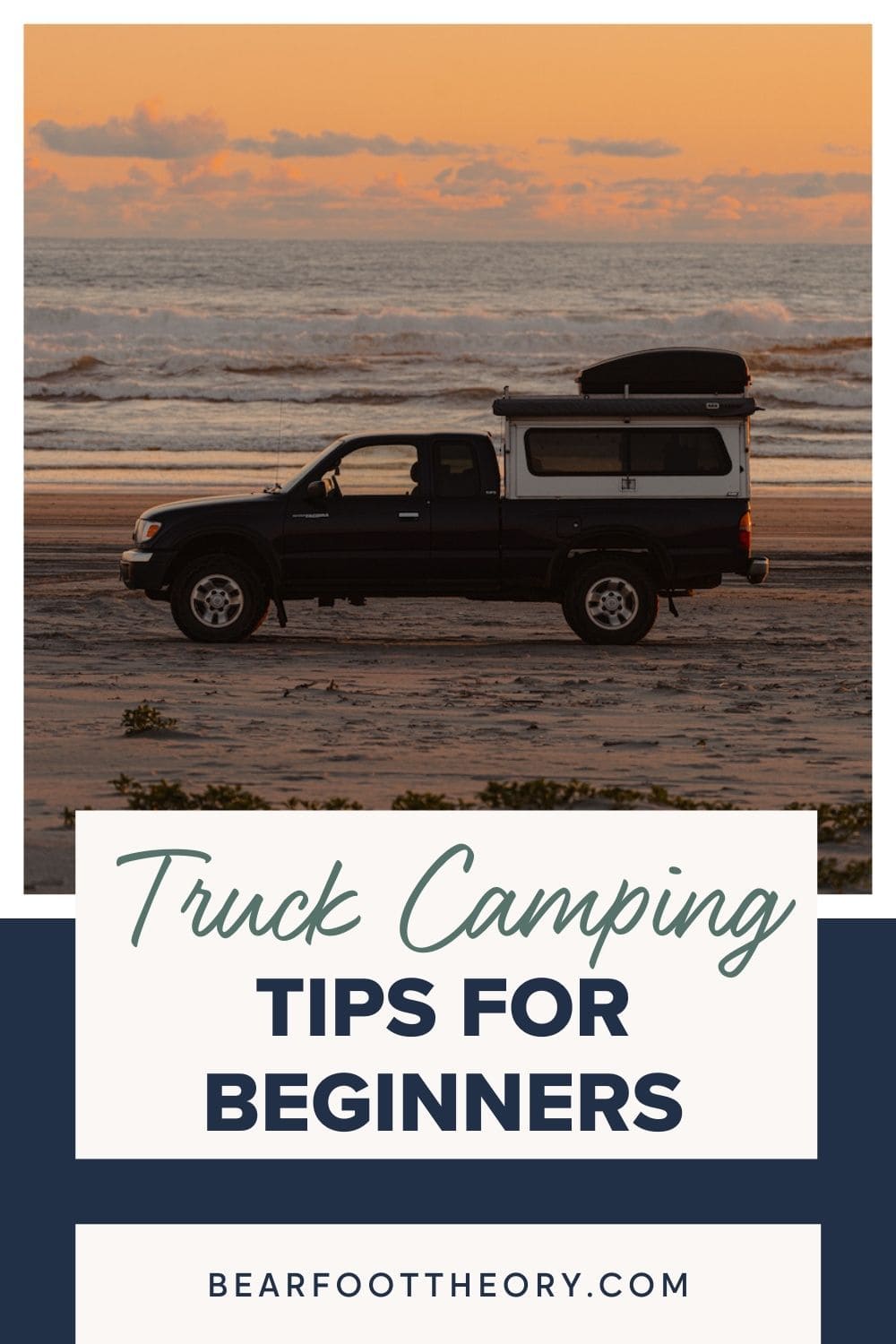10 Truck Camping Tips for Beginners
Curious about truck camping? Learn our best truck camping tips from someone who’s lived the lifestyle
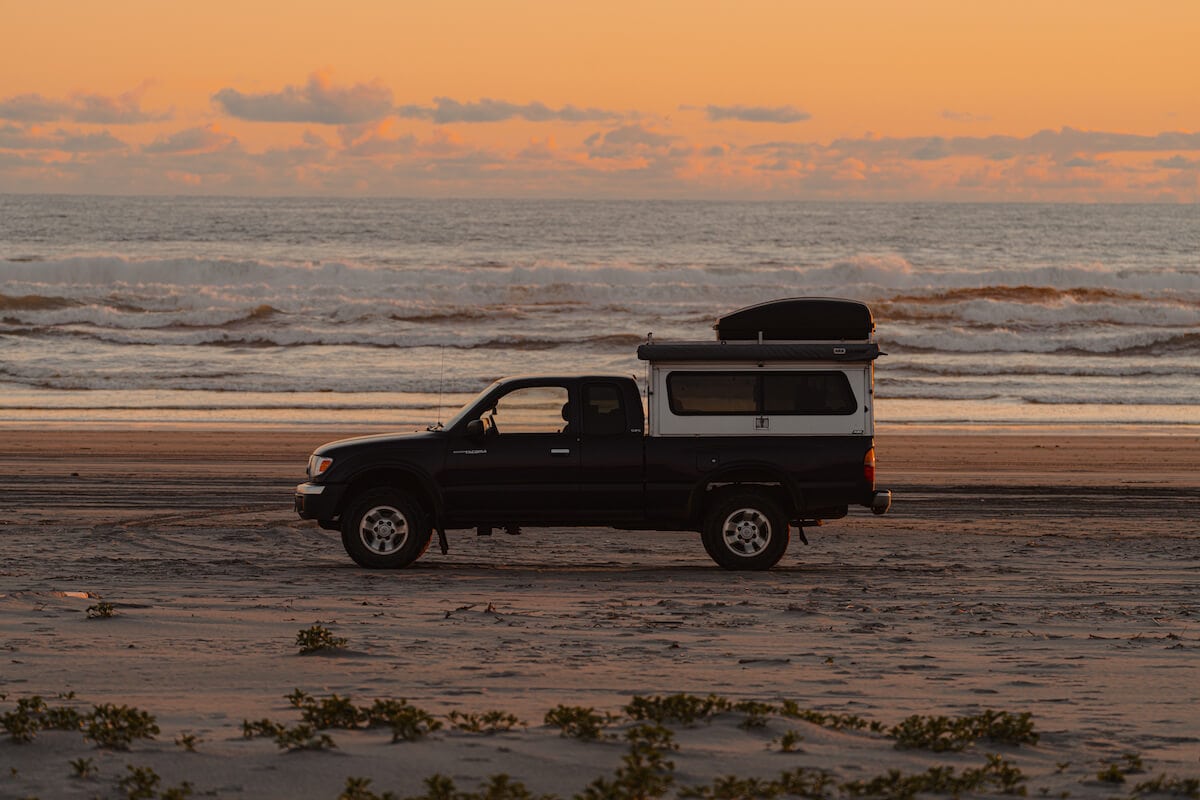
Folks have been sleeping in vehicles since the invention of the wheel but never before in human history has the idea of it been quite so… glamorous. For many of us outdoorsy folk, a decent portion of our social media feeds are filled with van lifers, RVers, skoolie-dweller, and truck campers. We’ve probably also spent a good chunk of time thinking about what life on the road might look like and what kind of vehicle would best suit our needs. As with most choices, every kind of vehicle has its merits and limitations.
For me, when it comes to life on the road, nothing beats a good ol’ fashioned pickup truck for truck camping. Trucks are simple, available, and affordable. There are a lot of reasons why a truck makes sense but most of all, truck camping gives you easier access to off-road destinations. They might not be as spacious or have as many conveniences as vans or RVs, but trucks can get you places that your other options simply can’t. If getting off the beaten path is your main goal, a truck might be the best vehicle for you.
I’ve learned a lot over the last few years of sleeping in my truck and here are my top 10 truck camping tips for beginners.
All photos courtesy of Jono Melamed
#1 campsite finder app
Try The Dyrt PRO free for 30 days
Get a FREE 30-Day membership to The Dyrt PRO, one of our favorite apps for finding campsites.
Perks include:
• 5,000+ free camping locations
• 1,000+ campground discount network
• $0 extra booking fees
• Get reservations at sold-out campgrounds, and more
Use the code BEARFOOT to get 30 days free!
Find the Right Mechanic
The number one rule of truck camping is that you won’t be camping anywhere if your truck can’t get you there. That’s why my first tip is to find not just any mechanic, but one that understands the kind of driving and off-roading you will be doing with your truck.
You don’t want a mechanic that will just go through the normal oil changes and tire rotations. Instead, you want to find someone that will help you make decisions about upgrades and give you ideas about how to set up your maintenance schedule. Most importantly, a good mechanic will build a relationship with you and your vehicle over time and learn how to look after it by doing so.
Unlike other vehicles, investing in an adventure rig is more than just a financial investment. It’s an emotional one, too. Vehicles that you take into the backcountry will become part of the most memorable experiences that make your life so special. Find yourself a mechanic that actually wants to be a part of that.
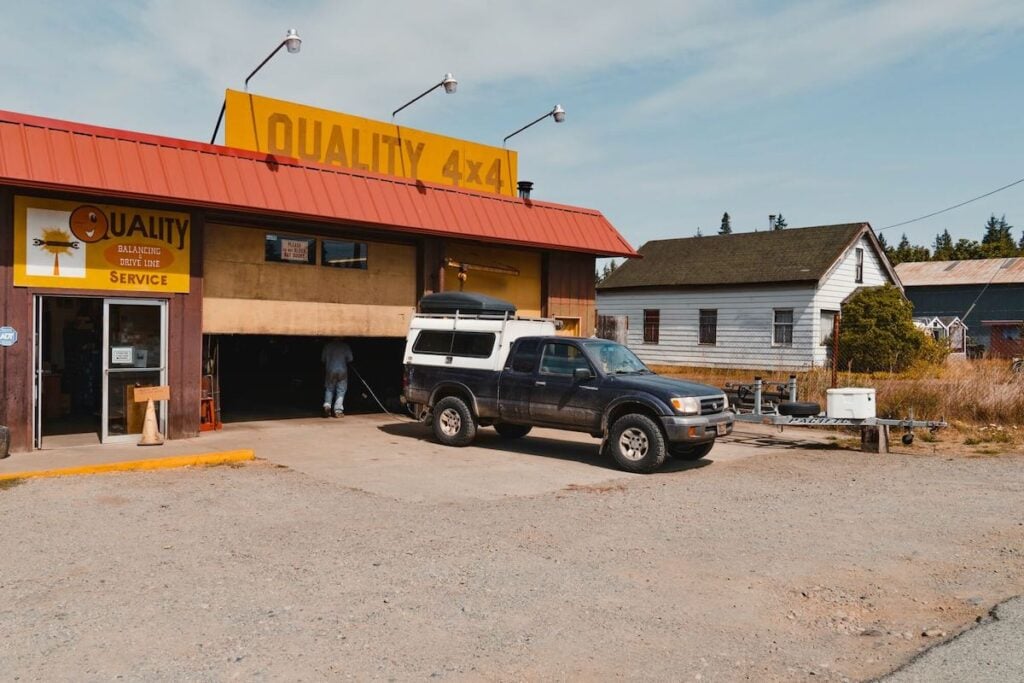
Pick a Durable Truck Camper Canopy
I am now on my fourth iteration of truck camping and, after two trucks and four canopies, I have learned that your canopy is actually more important than your truck. Your canopy dictates how much room you have, where you can go, and how warm and dry you’ll be.
Truck canopies come in all shapes and sizes and are designed with a variety of purposes in mind. Some are built for simple storage while others are built to be a bit more utilitarian.
The two basic materials that truck canopies are made out of are fiberglass and aluminum. Fiberglass shells tend to be more form-fitting. They’re more aerodynamic and cut down on wind drag, giving you better gas mileage. Aluminum canopies, on the other hand, might not be as streamlined, but they are easier to find and can be easier to work with if you are thinking of doing modifications while designing your build.
You’ll want a truck camper canopy that is:
- Tight fitting: You don’t want gaps for water or cold wind to get through.
- Can be ventilated: Truck campers get hot and smelly… You’ll need a way to keep air moving throughout.
- Can be insulated: This is a big one. It can get cold when you sleep in a truck, so you want to make sure your truck camper can be insulated.
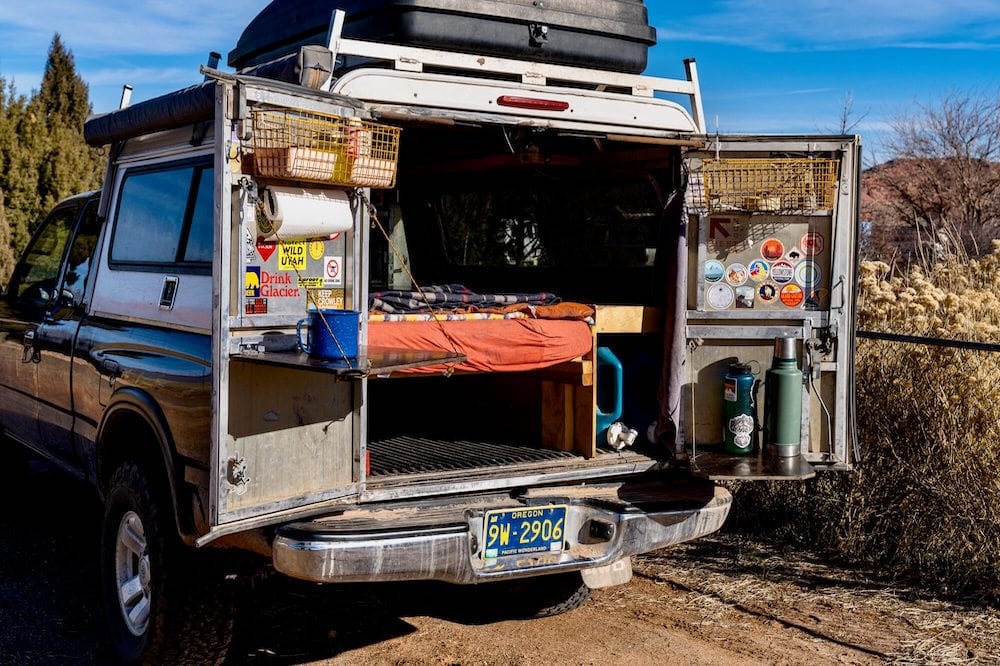
Your Truck Isn’t a Van
This might seem obvious, but it’s worth mentioning because truck camping and van camping are often quite different.
The internet has SO many ideas for how to build out a vehicle and while you can definitely adapt some van life vibes to fit a truck camper, the majority of van builds simply aren’t built to stand up to the beating that your truck might take nor do they accommodate the unique spacial challenges that come along with living in a truck.
While every version of living in a vehicle requires you to pair down your physical possessions and embrace a more sparse lifestyle, truck camping is by far the most minimalistic. You have less room to work with and chances are, you’re driving on some pretty rough terrain, which tends to wreak havoc on everything inside of it. It’s just something to keep in mind.
From books to my favorite pocket knife, I’ve had just about everything you can think of scratched, sanded down, or otherwise ruined from rattling around in my truck. I’ve learned to pay attention to how my belongings are stowed so that they don’t bump against each other while I drive. I’ve also learned to line the bottom of any not-so-smooth storage areas with a layer of foam or shelf liner and wrap delicate items in fabric or store them in bags where they won’t move around so much.
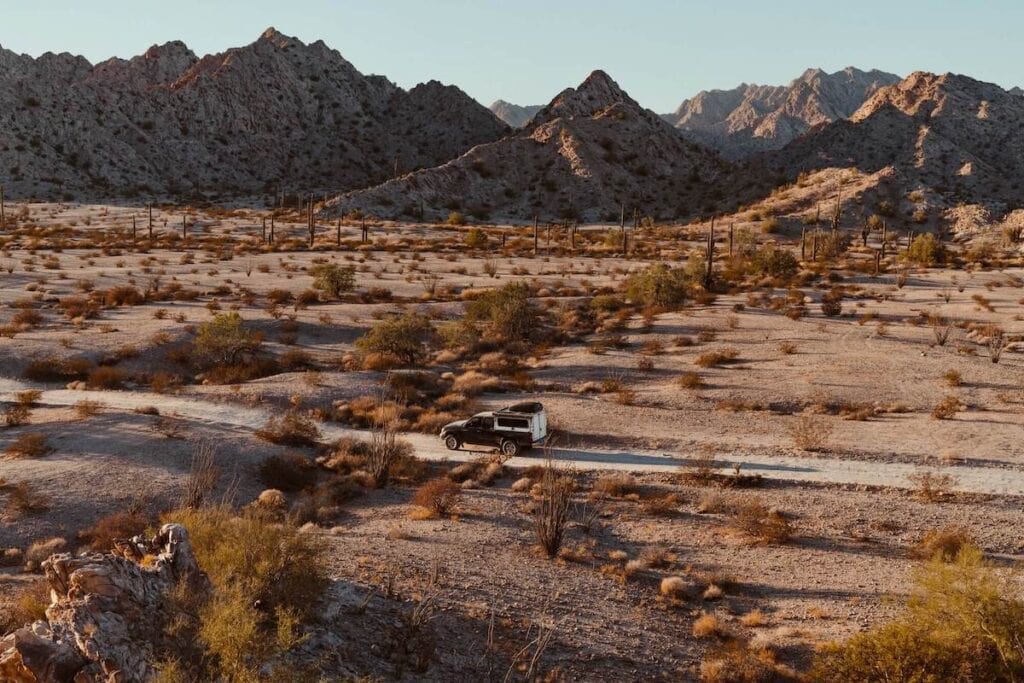
Plan Your Build Around Your Gear
Before you decide on your truck camper build, think about what gear you will be bringing with you most often and design your build around that.
Questions to ask before planning your truck camper build:
- What gear are you going to have with you?
- What kind of cooler do you have?
- How will you store your water?
- How will you store your clothes? In bags? In bins?
- What do you want your kitchen setup to look like?
- What seasons will you camp? Camping in fall or winter is going to be very different than in mid-summer.
Asking yourself questions like these will save you a lot of grief down the line should you start building and realize something important doesn’t fit. It’ll also give you an opportunity to look into your gear and replace things that could maybe fit better.
For instance, over the years, I’ve either bought or randomly found myself in possession of water jugs of all shapes and sizes. Once upon a time, when I used to camp in a Subaru I kept my water in these 4-gallon cubes. When I was thinking about putting together my first truck build, I thought about my water situation and decided that those jugs didn’t really work, so I designed my build around two Reliance 7-gallon Jumbo-Tainers. If I had designed my build for the water jugs I had at the time, I wouldn’t have been able to fit the jumbos which have now become my favorite water jugs.
Now, I’m not suggesting upgrading all of your gear before you build something in your truck. Instead, I’m suggesting performing a thorough audit of your gear and putting some real thought into what’s working for you and what isn’t. If a particular piece of gear is absolutely perfect for your needs, great! Plan on having something that size and shape in your final build design.
On the other hand, if something isn’t really doing its job and you know you’ll be replacing it at some point, do some research and come up with an idea of what you might replace it with down the line so that you can factor that in while finalizing your design.
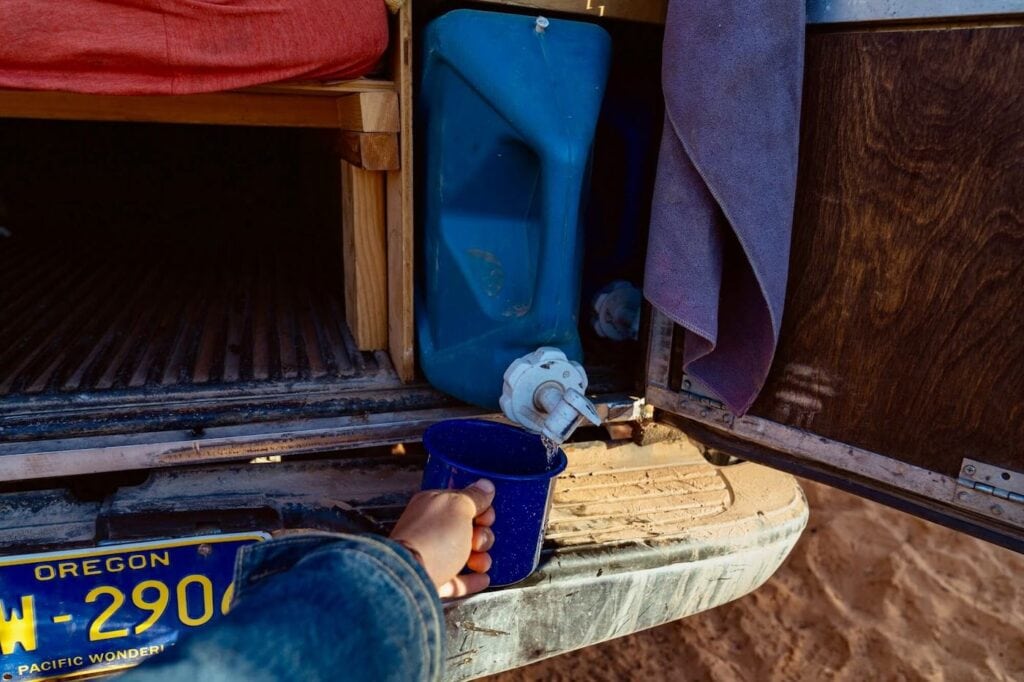
Give Everything a Home
Keeping your truck organized is good for not only your stuff but also your sanity. Creating a good organizational system will take some time, but trust me, it’ll be worth it. It doesn’t matter if something lives in a bag, in a bin, or in a compartment of some kind as long as it lives somewhere. Some people prefer to build out drawer systems under their bed, which can be very helpful but can also add a bunch of weight to your truck camper. I personally prefer to use plastic bins for smaller items and then throw all of the big stuff in “the attic” cargo box up top.
Here are a few helpful organization tips for truck camping:
- Group items together based on what you use them for. For example, keep cooking supplies near your food bin, extra bedding all in one place, and phone and electronic charging cords close to your charging station.
- Group things based on when you use them. For example, items that you don’t use very often can go in harder to reach spots while things you use every day should be more easily accessible.
- Have areas dedicated for things that might get put away wet, muddy, or otherwise disgusting. Life on the road isn’t always the cleanest, but you can save yourself a lot of sanity if you isolate the grimier aspects of it to a few areas.
- When it comes to bins, boxes, and bags, choose several small ones instead of one or two big ones. This makes it easier to grab just what you need instead of having to lug around or unload everything just to find one item.
Optimize Your Outside Vibe
You set out on this journey in order to be able to spend more time outside so don’t forget to consider the area around your truck as part of your rig. The tailgate is the most obvious and universal outdoor feature of your truck, but other areas can also be utilized and or designed around.
Hands-down, my favorite parts of my rig are the ones that allow me to comfortably be outside my truck while cooking, eating, or working.
Here are my truck camping outdoor essentials:
- A good camp chair
- Hammock
- Camp table
- An awning: this has saved me more times than I can count up in the Pacific Northwest during the wetter months
- Bucket toilet
- Portable shower
- String lights
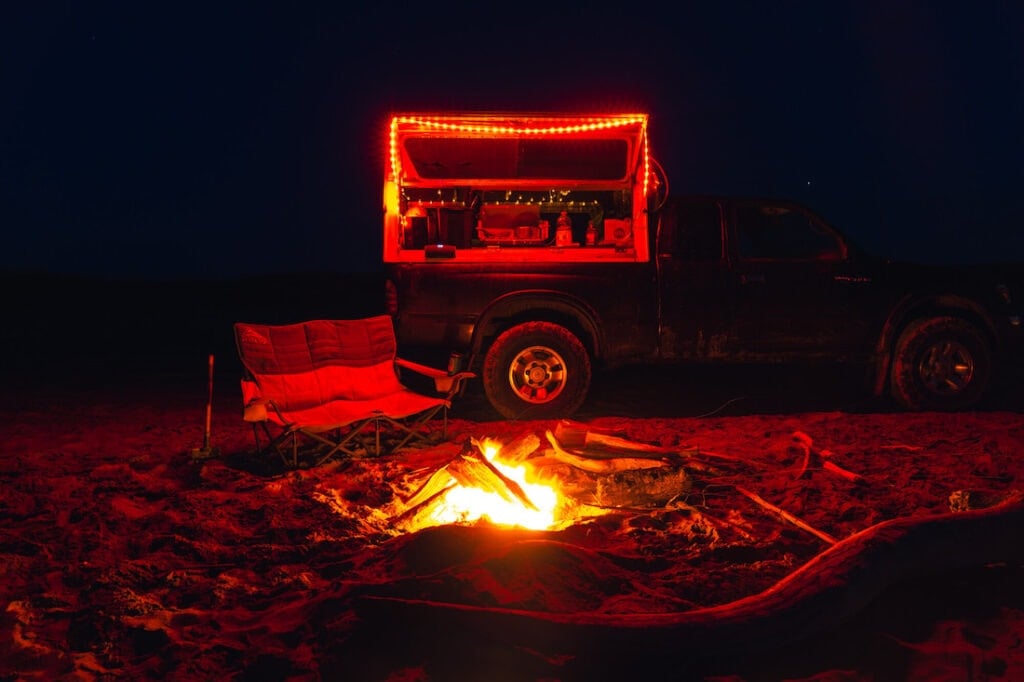
Get a Full-Sized Spare Tire
Ditch the donut… Just do it. Standard issue spare tires aren’t made for adventurous folks. Instead, they are designed to help you hobble home on the pavement. I’ve seen more than my fair share of spare tires explode while trying to make it back to civilization and have since lost all faith in the donut.
Almost every mechanic in the country has a few old tires laying around so just make a few calls and pick up something inexpensive but reliable so that you’re covered in the case of an emergency. It doesn’t have to be fancy, brand new, or even match the brand and model of the rest of your tires. It just needs to be the same size.
After you’ve ditched the donut and gotten a full-sized spare, check it often. The only thing worse than having to drive through the backcountry on a donut is going to change flat in the middle of nowhere to find out that your spare is somehow also flat.
Carry an Emergency Communication Device
When it comes to trunk camping, or really all backcountry wilderness experiences, peace of mind goes a long way. That’s why I believe everybody who spends time in the outdoors should have an S.O.S button and communication device in case of an emergency.
Having a way to communicate with the outside world is always a good idea, but it’s an especially good idea when you find yourself somewhere remote, like 15 miles into the Bonneville Salt Flats in Utah, the only place that I’ve ever actually gotten stuck in my truck.
There are many solutions for backcountry communications, but I choose the Garmin InReach Mini, which is also Kristen’s top choice.
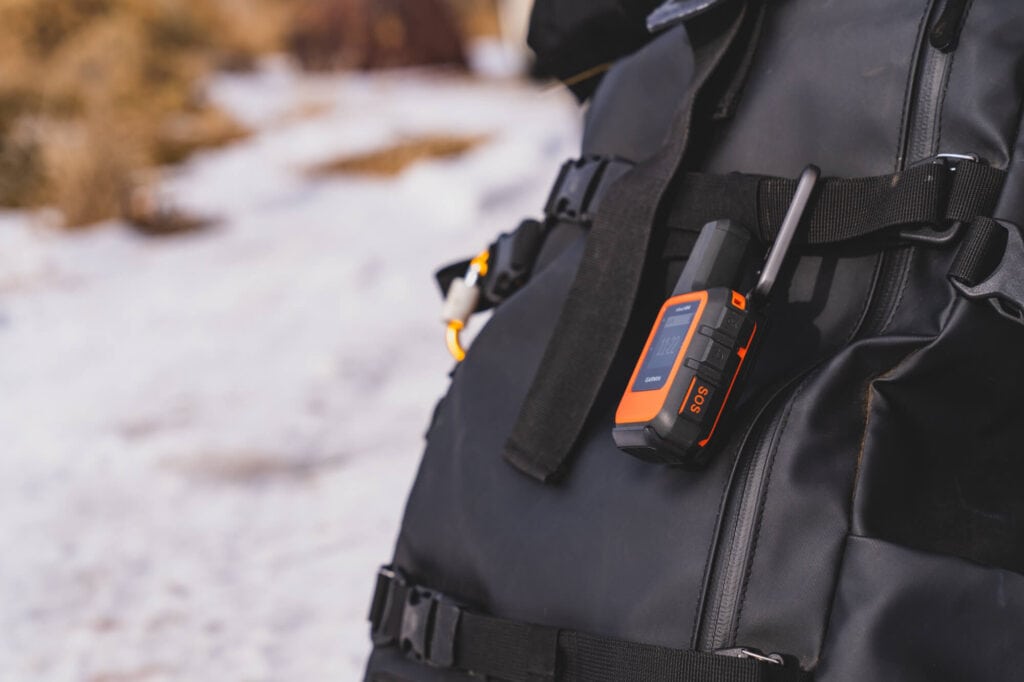
Have a Solid Truck Kit
Having a solid assortment of truck tools will not only help you out if and when things go wrong but it will also enable you to help others who find themselves in similarly precarious situations. It’s very important that the items in your truck kit are dedicated to your truck and your truck alone. Once you start using those tools for other purposes, the chances of them not being in the truck when you actually need them increases, which defeats the entire purpose of having a truck kit in the first place.
Here’s an idea of what a good truck kit looks like:
- Jumper cables. Batteries die, it’s a simple fact of life.
- Recovery straps. Having a recovery strap and a couple solid D rings has gotten me and my friends out of quite a few predicaments. You never know when someone might get stuck and it’s always a good idea to be able to pull them out.
- A foldable shovel. Being able to dig a hole is pretty useful outdoors. Whether you’re burying a fire, digging out a stuck car, or making yourself a cat hole for a good morning poo, a foldable shovel is a good thing to have lying around.
- Work gloves. There are so many reasons to protect your hands in the wild with work gloves.
- A multi tool. I have two of the exact same multitool, a leatherman wave. One is usually on my belt or in my pack while the other lives in my glove compartment.
- A toolbox. Everyone has a different idea of what needs to go in a truck toolbox but thinking about it and having one of your own goes a long way.
- Tire pressure gauge. Invaluable if you’re going to be airing down your tires while offroading and also just when it comes to knowing what’s going on with your tires in general.
- Ice scraper. De-icing without one is a pain
- Emergency batteries. Get yourself a decent amount of AA and AAA batteries and never ever use them unless it’s an emergency. Seriously, you want to have them around.
- Tarp. You never know when you might need to make an impromptu shade structure of keep an area dry during a storm.
- Emergency flashlight. Have you ever had your headlamp die while trying to change your friend’s flat tire? I don’t recommend it.
- First aid kit. It’s not a matter of if you need a first aid kit, it’s a matter of when. Being prepared to deal everything from minor cuts and bruises to more major medical issues is an integral part of living an adventurous life.
- Rigging gear. I’m always amazed by how often I end up needing to rig stuff on the road. A good rope, some paracord, a few assorted bungies, and a couple ratchet straps goes a long way.
- Blankets. Having an emergency blanket in the truck that never comes out for washing or to be used in other camping situations can be the difference between a brisk time and a dangerous experience.
- A fire starter kit. Being able to make a fire is incredibly helpful in both the best and worst of times. Having a few reliable lighters, some lighter fluid, and some kindling can make you both the life of the party and a lifesaver, depending on why you need to fire.
Dogs are a Truck’s Best Friend
It’s no secret that dogs make pretty much everything better but when truck camping, dogs are more than just a good time. Aside from all of the fun, a dog can provide a truck camper with two basic but very important utilities: heat and security. First, dogs produce a lot of heat which can be very useful in the colder winter months. A good blanket and/or sleeping bag is definitely necessary to keep you comfortable at night, but a nice snuggly pup can bridge the gap between comfortable and cozy. Put them in your sleeping bag or next to you under a blanket and get ready to get toasty.
When sleeping outdoors, safety should always be a concern regardless of whether you’re sleeping under a tarp, in a tent, or in a vehicle. Choosing to sleep outside always brings with it the possibility of an unwelcome encounter with wildlife or less than savory personalities. Truck campers and other vehicle dwellers have an added layer of this because, no matter how hard you try to avoid it, if you spend enough time sleeping in vehicles then at some point we’re gonna end up sleeping in a parking lot, on the side of the road, or at a trailhead where you might not be alone.
Having a dog with you is just like installing an extra cute and portable security system. A loud and free alarm that acts as both an alert as to what’s going on outside your truck and a deterrent for anyone or anything in earshot.
Nobody wants to mess with a barking dog inside a truck… nobody!
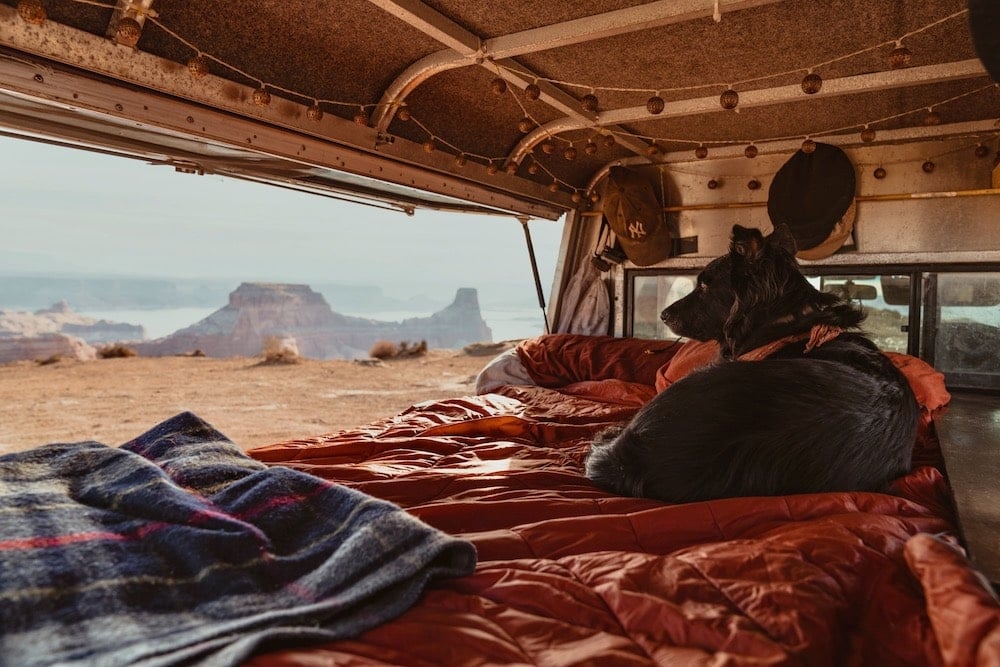
There are so many different ways to go about camping in a truck and everyone is going to do it differently. There’s no right or wrong way, these have just been a few things that I have learned during my time truck camping.
Do you have your own truck camping tips and tricks? We’d love to hear about them and your truck camper set-up. Let us know in the comments below.

